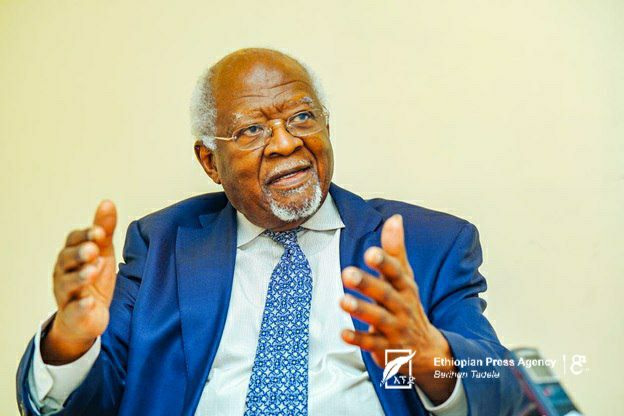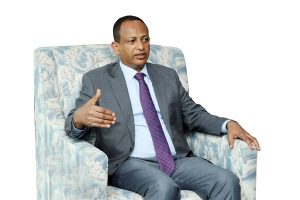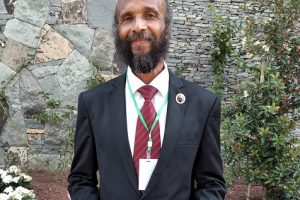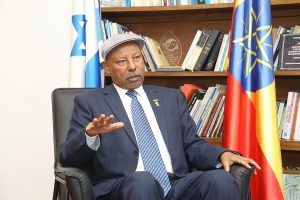
Today’s guest, Dr. Julius W. Garvey, was born on August 16, 1933 in Kingston, Jamaica to United Negro Improvement Association founder Marcus Garvey and activist Amy Jacques Garvey. The younger of two sons, Garvey was raised in Jamaica. He graduated from Wolmer’s Trust High School for Boys in Kingston in 1950; then earned his B.S. degree from McGill University in Montreéal, Canada in 1957, and his M.D., C.M. degree from McGill University Faculty of Medicine in 1961.
While in Addis Ababa, Ethiopia to participate in the launching of a new Global Black History, Heritage, and Education Centre (GBHHEC), The Ethiopian Herald had a brief stay with Dr. Julius W. Garvey and raised points directly and indirectly related to the struggle of black people from the yokes of racial discrimination and the role of Adowa. Enjoy the read!
Your father Dr. Marcus Garvey was a notable personality in his struggle to liberate the black people from the yokes of racial discrimination to what extent do you think had his goal for the black people of the world succeeded?
That is an interesting question. A lot of progress has been made but many people do not think that progress has been enough or swift enough. First of all, he was born in 1887 and secondly he formed his organization the Universal Negro Improvement Association and African Communities League in 1914. So, at that particular time, slavery was abolished in the Caribbean in 1838 and in the United States in 1865 and the Berlin conference was in 1884 and 1885.
So, there was a transition from slavery to colonialism. So, that was the order of the day in terms of the early 19th century. He created that organization of the UNIA-ACL and basically to unite African people around the world and to uplift them in terms of the condition in which they were in, meaning striving towards our freedom or towards removing the yoke of colonialism.
The Berlin conference took place in 1884 and 1885, all of Africa was cut up, and all of the Caribbean was colonized. So, the organization achieved significant growth in a very short period of time – it subscribed some six million followers. But I am going to fast forward a little bit and say that today there are 54 independent African countries.
At that time, only Ethiopia was independent, when my father was around, and Liberia was pretty much a client state of the United States. And if you look at the Caribbean, all the countries in the Caribbean were independent. And CARICOM, was the coalition of 15 Caribbean countries for a trading area. All those were free.
So, progress has been made, but I guess the other side of your question is, we live in a near colonial period in terms of the yoke of imperialism. It is still present, and the globalization has continued to take its toll in terms of the centralization of power in the United States and some other European countries, but primarily in the United States.
So the growth and development of these 54 independent countries has not occurred as quickly as we would like to say but to see in terms of development, and the same thing in the Caribbean. Because most of the systems that have been put in place, let’s say since 1945 after World War II, such as the United Nations in 1948 and so on, have been put in place as a replacement for colonial structures.
But to continue the same domination, the World Bank and the IMF, the World Trade Organization, World Health Organization, all of those still constitute obstacles to the development of African people worldwide. So, progress needs to be made still. And to achieve maximal progress, we really need a federated United States of Africa. And of course, you need the Caribbean and the Americas as well.
Black people are still under the influence of neo-colonialism. In your opinion, what are the problems holding back people from emancipating themselves from discrimination and racial abuses?
My father, in a speech in Halifax, Nova Scotia, Canada in 1937, said that we must emancipate ourselves from mental slavery. While others may help free the body, only we can free the mind. Bob Marley later incorporated this idea into his lyrics in Redemption Song. Emancipating the mind from mental slavery is crucial because in the past 20 years, our educational systems have become mis-educational. They distort history and fail to accurately represent the relationship between Africa and the rest of the world over time.
African history has been distorted, minimized, books have been burned, and people have been killed. This mis-education process has been ongoing for over 500 years, as highlighted by Carter G. Woodson in his book on the mis-education of African people in the 1930s. Each phase of history, whether it be enslavement, colonialism, or neo-colonialism, has perpetuated this mis-education.
The curriculum in many universities, including historical and black colleges in the United States and universities in the Caribbean, still reflects what the colonizers established. The curriculum needs to be completely rewritten from an African perspective. This mental enslavement is what continues to hold us back. We have yet to break free from these chains.
One of the reasons for the subjugation and discrimination of blacks is their economic challenges. How do you think African countries and blacks across the world can alleviate this problem?
The reason for slavery was to steal human resources as well as physical resources from the earth’s crust or surface, and this continued through the colonial and near-colonial periods.
Many financial and economic systems, such as the World Bank, the IMF, and the World Trade Organization, hinder the development of former colonies through high interest rates. For instance, Haiti had rice dumped on them from the United States due to American farmer subsidies. A contract was signed with the Haitian president to import American rice, which was sold at a lower price than what Haitian farmers could produce. This led to a decline in rice production in Haiti.
A similar situation occurred in Jamaica with the milk industry, where American farmers sent their milk. This coercion is often carried out by governments like the United States or colonizers. Since World War II, America has taken on a colonial role as the most powerful country.
These factors hinder our development despite our abundant resources. Africa, for example, is the richest continent globally, with 60% of arable land, 40% of gold, diamonds, and platinum, and 80% of coal. However, governments are often undermined through bribery, engineered coups, or assassinations.
Since the 1960s, over 10 African leaders have been assassinated. These are ongoing problems that can only be addressed by a federal government with sufficient strength, a single currency, a unified army, and the ability to resist outside influences like the European Union and America.
How do you view the struggle or effort of promoting the history and civilization of black people in African countries at this moment?
It is definitely important to focus on that. Interestingly, I was invited to Ethiopia to participate in the launch of a new institution called the GBHHEC, which will focus on education, heritage, culture, and sustainable economic development. I have been asked to participate in this initiative.
Other agencies such as UNDP, NEPAD, African Development Bank, and the International Monetary Fund also need to prioritize economic development. It is crucial for the liberation of the mind and understanding that Africa must take a different path from Europe. Europe’s focus on rapid resource utilization to create consumer products results in pollution, obesity, and an unsustainable economy. Africa must avoid these pitfalls by valuing clean water, air, and land, and transitioning away from fossil fuels.
The climate crisis is intertwined with the socio-economic crisis stemming from Europe’s scientific materialism. African humanism, based on principles like Ubuntu and Ma’at, must be emphasized. Our universities should educate students not only on various subjects but also on the philosophy and cosmology of life itself. As the origin of humanity and civilization, we must reclaim our history and traditions to offer the world in the 21st century.
Decades ago, there were advocates for black rights, such as Martin Luther King and Malcolm X. Are there still individuals of similar influence or caliber working for the rights of black people today?
I believe transformation should be seen as a process. Many view transformation as a violent revolution, expecting change to come quickly through revolution. Malcolm X once said, “the revolution won’t be televised.” Change is not instantaneous; it happens gradually over time.
A charismatic leader is necessary to express the feelings of the people who may not be able to articulate them for themselves. This leader can understand the people and articulate their needs, creating a movement towards necessary change. However, what is ultimately needed is the institutionalization of freedom ideas. These ideas must be clearly articulated in terms of ideology, then institutions must be created as a result of this ideology, and people must be educated within these institutions.
While charismatic leaders have been important historically, I believe we are now beyond the need for them. With the advancements in information technology, such as WhatsApp, people are more aware of the issues we face. The recent coups in Francophone Africa, where young people are rising against exploitation, demonstrate this shift in awareness and desire for change.
The force for change has now shifted to the younger generation, who have the energy and understanding to challenge the status quo. We need leaders who embody servant leadership, focusing on the collective good rather than personal gain. Unity is crucial, as it gives us strength to move towards controlling our resources and benefiting from them.
If we unite with this understanding, we can move in a different direction from Europe and America. Looking at historical development paradigms, countries like Russia and China developed behind curtains to protect their resources from exploitation. Africa needs to do the same to develop with its resources and brainpower.
What should institutions, including the GBHHEC, and other Black people’s movements do to truly liberate the African people?
When you examine European systems of governance, philosophy, and religion, you’ll find that their system is based on individualism. The focus is on the individual person, who is seen as separate from others and their environment. The purpose of life for this individual is self-benefit, not societal contribution or stewardship of nature. It’s all about individual freedom to do as one pleases.
Now, consider a scenario where a million people live in a 10-square-mile radius, with each person doing what pleases them. This situation leads to chaos, as everyone pursues their own desires. The only way to guide them in the right direction is through a controlling power and system. Throughout European history, this control has been evident in the feudal system, religious institutions like Roman Catholicism, and commercial hierarchies. Democracy, as practiced, is often a facade, with individuals being directed on whom to vote for.
In elections, such as those in the United States, candidates are chosen and funded by corporate interests seeking favorable laws. This system is heavily skewed, with5 % of the population holding 80% to 90% of the wealth.
Setting that aside, African systems have a different ideology. The African individual is not isolated but exists within a society, connected to nature and divinity. This unity is reflected in family, extended family, community, tribe, and nation. African history emphasizes the importance of extended families.
The Ubuntu philosophy encapsulates this unity: “because you are I am,” meaning there is a connection between individuals. This perspective shapes different educational, economic, and religious systems, recognizing the spiritual dimension alongside physicality. In contrast, European science often excludes the spiritual realm, focusing only on measurable aspects.
European religions are dogmatic, offering rewards in the afterlife for following rules. This separation of the individual from society leads to tensions and conflicts, as seen in various wars throughout history. Africa’s foundation, rooted in unity, offers a different approach that should guide future development, emphasizing sustainability and stewardship of nature.
In educating our youth, we must instill these values to ensure a prosperous future. Africa, with its young population, has great potential for growth, but it must resist the temptation to imitate European systems and instead build on its unique foundation.
As Addis Ababa hosts many Pan-African institutions like the African Union, it is becoming a hub of Pan-Africanism and other African organizations. What is your impression?
That is a fantastic question. I recently had the opportunity to visit the Adwa Museum, and I am truly impressed. I have some knowledge of Ethiopian history, such as the fact that humanity originated in the Rift Valley with Lucy. Ethiopia has played a central role in the development of civilization over time. As a Nile Valley civilization, it was one of the first civilizations and has never been colonized. I am aware of the significant historical event in 1896, which I believe you will be celebrating on March 2nd.
It is remarkable to know that Africa was able to resist colonial domination and defeat the Italians in the Battle of Adwa. This victory holds great importance for African people, similar to the resistance in Haiti against the French in 1804. These events have instilled pride and a sense of unity among African people. The Battle of Adwa marked the birth of the Pan-African spirit and contributed to the formation of the Organization of African Unity, with Emperor Haile Selassie I playing a key role.
My visit to the museum highlighted the unity and mobilization of the Ethiopian population against the Italians, with women playing a crucial role in supporting and caring for the warriors. This display of dedication and unity was truly inspiring.
Ethiopia has been instrumental in the independence movement and the development of Pan-Africanism, as well as in the establishment of the African Union. It is clear that Ethiopia has a responsibility to continue carrying this legacy forward, and I believe it is doing so. Ethiopia is central to the concept of Africa as a civilization and a geopolitical entity, and it is taking its rightful place in the world.
What was the reason that inspired your father to fight for the freedom and equality rights of black people?
I believe my father was divinely inspired. It wasn’t a calculated decision over time. From his boyhood and as he grew up, he understood the injustices being done to our people. At a young age, he traveled not only throughout Jamaica, but also the Caribbean and Central America, witnessing the conditions there. In 1912, he went to England, traveled Europe, and saw the conditions there. He spoke to people from various European countries, interacted with African university students and sailors, and learned about the situation in Africa.
All of these experiences inspired him. He was particularly influenced by Booker T. Washington, who wrote “Up From Slavery.” My father read this book and understood that there was a way to lift ourselves from slavery and colonialism. He drew inspiration from the work done at Tuskegee Institute by Booker T. Washington in educating young black men and women.
This inspiration stayed with him for the rest of his life. He dedicated himself entirely to this cause, overcoming setbacks and eventually leading an organization of over six million people in the 1920s. It’s difficult to fully explain, but I believe it was a gift from God, much like the talents of a great artist or musician.
My father did his best with this gift, and it has had a significant impact. Many influential figures such as Kwame Nkrumah, Jomo Kenyatta, Nelson Mandela, as well as leaders in the Caribbean, Martin Luther King, Malcolm X, and others, drew inspiration from him. He played a crucial role in this revolution.
The 21st century is heavily reliant on digital technology, as it has become a means of accessing information from around the world. If Africa does not free itself from this dependence on digital technology, it risks losing its future. What are your thoughts on this?
Digital technology, or digitization, is simply a tool, much like IT. All of science is just a tool; it depends on how it is utilized. There is a risk that digitization, artificial intelligence, robotics, and other technologies could be used against humanity, depending on the ideology driving their development.
Humans must be in control of technology. Unfortunately, in the West, technology now controls humans, with new inventions constantly being created to make things faster or more efficient, without considering the consequences. What is the point of industrial and technological revolutions if they harm the planet? True progress involves sustainable development, understanding the society and civilization being created, and placing human beings at the center of it all, not technology.
In Western civilization, technology is at the forefront. People eagerly embrace new technologies, such as 5G, without considering the implications. This mindset has been instilled by those who control technology and, by extension, control society. It all comes down to control, much like the feudal system of the past. Africans must learn to master the process of digitization and ICT in order to navigate this new era effectively.
If you want to contribute more points for the next generation, what would you like to say?
The future rests in the hands of the younger generation. Unfortunately, we are not adequately supporting them. It’s distressing that 100 million young Africans are not enrolled in the education system, and that 60% of African youth are unemployed. This is evident in the hardships faced by young people crossing the Sahara in search of opportunities.
We have let down our youth, yet we continue to discuss the youth demographic. Where is this demographic? Africa has the world’s youngest population, and it is crucial to train and educate them for the future needs of the world.
While Europe and other regions have aging populations, Africa has a youthful population. It is a waste of resources not to invest in their education. Our youth must be educated to unlock the potential that exists in Africa and to create a comfortable life.
You don’t need to be a millionaire to succeed. Entrepreneurship is not solely about making money, but also about creating quality products, satisfying customers, and making a reasonable profit without harming the environment or exploiting others.
There is enough wealth for everyone to share. We need to embrace a civilization paradigm based on humanism, particularly in Africa. It is essential to prioritize educating our youth and providing them with skills training across various fields, from carpentry to digitization.
If I am not mistaken, is there a center for Dr. Marcus Garvey in Ghana? Do you have plans to create a similar one in Ethiopia?
Yes.
When do you plan to do that?
Oh, we’re starting. Inshallah.
That is all the questions I have for you today. Thank you very much.
You are welcome.
BY GIRMACHEW GASHAW
THE ETHIOPIAN HERALD SATURDAY 2 MARCH 2024





